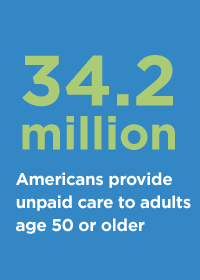Is It Time for the Talk

How do you know when it’s time for “the talk?” If you’ve had these thoughts as someone taking care of elderly parents, it’s a pretty good indicator. When you’re worrying more, visiting more (and seeing more changes when you do), and feeling stressed or overwhelmed as a result of caring for elderly parents, it’s time to reach out for support. If you’re wondering what the future holds for your parents, it’s probably time to start a conversation about senior care.
How to Know You’re a Caretaker
If you’re taking care of elderly parents, you’re in good company.
Seeing subtle or drastic changes in your older loved one, or supporting aging parents from near or far? You’re not alone.
A report from the National Alliance for Caregiving and AARP indicates that approximately 34.2 million Americans have found themselves providing unpaid care to an adult age 50 or older. And this unpaid care was last valued at a staggering $470 billion dollars, per AARP’s Valuing the Invaluable report.
According to a Merrill Lynch study, eight in ten Americans believe that caregiving is the “new normal” in American families. This number will only grow as the United States manages an aging population.
 You’re a caregiver if…
You’re a caregiver if…
Many adult children don’t think of themselves as a caregiver unless they’re providing round-the-clock hands-on support, like assistance with bathing and showering, feeding, or incontinence care.
The reality is that boomers comprise the majority of the 40+ million caregivers (for people of all ages) in the US, and 25% of millennials are now providing care too, per the AARP and National Alliance for Caregiving report. It’s far more common than you might think.
Maybe you haven’t officially considered yourself a caregiver, but if…
- you’re calling Mom to check in every day, and have started assisting her with money management and food shopping, you’re a caregiver.
- your Dad moved in after your stepmother passed away, and you take him to doctor’s appointments and remind him to take his daily meds, you’re a caregiver.
- you pick up your mother-in-law once a week and bring her to chemotherapy treatments, and you’ve started researching home care agencies to support her in daily life activities, you’re a caregiver.
If you are taking care of elderly parents in any way, be it on a daily, weekly, or monthly basis, you are a caregiver. Now, it’s time to have the talk and open the conversation around care options.
Starting the Continual Conversation
A quick word of advice: reflect before you talk.
It’s never easy to have the talk, so before you begin the conversation, make sure you’re prepared. You may have been taking care of elderly parents for a long time, so this conversation is just as emotional for you as it is for them.
Before you sit down to talk to senior parents, take some time to reflect on the changes you’ve been seeing in their health, home, and general well-being. Sometimes these changes happen slowly and subtly, and don’t seem like much until you stop and consider their cumulative effects. Sometimes a change is extreme, happening overnight and requiring an immediate decision — with barely any time to reflect, or even understand how it happened.
Understand your role as a caregiver.
Understanding your role as someone taking care of elderly parents is pivotal as you start a conversation about senior care and housing.
That’s because even if your parent or older loved one ultimately moves to assisted living — or you decide on home care — you are still a caregiver. You must still coordinate, advocate, and communicate with the care provider you choose. You will still be involved, and the conversation about care preferences is an ongoing one.
But embracing your caregiver role does not mean you must take the reins and control the entire process. And all too often, this scenario is what plays out in families, particularly when some kind of health emergency pushes the family to a decision-making crossroads.
Choosing care is not a one-and-done decision. It’s a process, and one that will change both you and your loved one in a number of ways. Are you open to the possibilities and prepared for the challenges?
If you’re ready to get started, check out these tips on how to talk to elderly parents about assisted living — or dive right in and find senior living options that are right for you.


